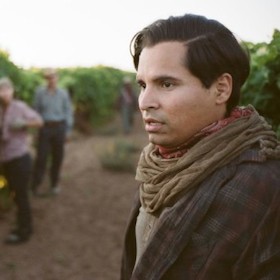'Cesar Chavez' Review: Biopic Serves Both History & Cinema

4/5
Cesar Chavez, a man unimposing in stature but powerful beyond measure through his passion, is immortalized once again in Diego Luna’s latest directorial effort. Starring Michael Pena as the titular civil rights hero, America Ferrara as his formidable wife and Rosario Dawson as his second in command, Cesar Chavez enlivens history, while managing not to embarrass with too many film clichés.
When the feature begins, Chavez is uprooting his suburban middle class family back to the land in which he and his father sowed in the dry farmland of Southern California. Chavez’s family is going to ruff it alongside their comrade migrant workers, while fighting for their freedom from under the thumb of the planters and landowners.
In his mission, Chavez is resilient, an unstoppable force. As for his home life, the movie doesn’t shy away from showing that Chavez’s job as a husband and father took a backseat, suffering for the sake of his vision for the Mexican and Filipino migrant workers. It was pivotal to him to rectify their plight, while the bullies beating on his son could wait. In the end, Helen Chavez – in a scene beautifully acted by Ferrara – steps up to confront the boys abusing her son.
The hardships facing the Mexican migrant workers were great, which Luna shows in numerous ways. Their poverty, apparent; their misery, palpable; the work before Chavez, inconceivable. Yet, amidst their hardscrabble existence, is the magnificence of the pastoral South West landscape, as rows of vineyards stretch out for acres upon acres. The despair of the workers is made all the more significant by the richness surrounding it, which is brought out through the film.
Chavez’s climb to influence has a slow start in Luna’s – at time’s pedantic – movie. In Cesar Chavez, the building of the National Farm Workers Association is the main rising action. Following a successful pilgrimage to Sacramento, Chavez’s movement picks up steam and accomplishes the rather large feat of achieving a sit-down meeting with the planters and landowners. A fast later on solidifies those around him to resolve themselves to be non-violent. And, when President Richard Nixon seeks to foil Chavez’s influence, the civil rights activist flies to England and wins the battle there as well.
What’s gleaned from Cesar Chavez is that the war its subject fought was an endless one, with battles in which the National Farm Workers Association never came into with an advantage. Each one, Chavez was forced to approach with newly conceived ingenuity, fueled by his unquenchable passion for justice for the people, for the underrepresented, for the disadvantaged. When the credits roll, Chavez is only starting the process of making his indelible mark in the history of America.
RELATED ARTICLES
Get the most-revealing celebrity conversations with the uInterview podcast!








Leave a comment